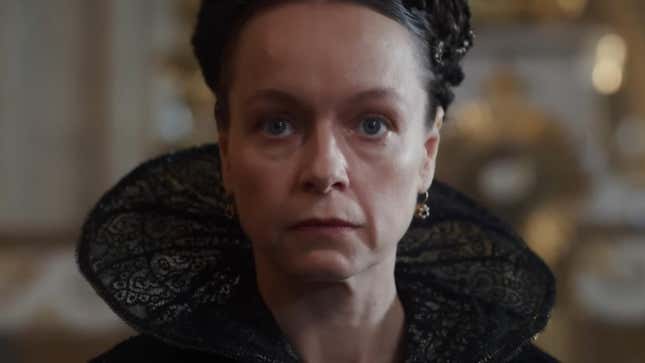
Hell hath no fury like a woman scorned. That’s a pretty perfect (albeit very outdated) proverb to describe the life of Catherine de’ Medici, the infamous, Italian-born noblewoman who became one of the most powerful and longest-serving rulers in French history. Historians have long painted de’ Medici—the queen consort of Henry II and subsequent queen mother of Francis II, Charles IX, and Henry III—as a Machiavellian matriarch who exerted considerable influence on the royal court to control French political life in the 16th century.
But in The Serpent Queen, the new Starz drama that reexamines de’ Medici’s remarkable rise to power, creator Justin Haythe allows both iterations of his protagonist to explain herself directly to the audience by breaking the fourth wall—a plot device that captures the irreverent, darkly comedic nature of the show but undermines the ambitious scope of the tale.
Based on the book Catherine De Medici: Renaissance Queen Of France by Leonie Frieda, The Serpent Queen packs an immediate punch with a venomous title sequence and a pilot aptly titled “Medici Bitch.” The audience enters the story through the eyes of Rahima (Sennia Nanua), an abused, fresh-faced servant girl who reluctantly becomes the new confidant of an older Catherine (Samantha Morton) before the coronation of her son, Charles IX. Catherine takes a keen interest in Rahima, using her as a pawn to cleverly show that anyone with the right amount of power—especially a young woman who has spent so much of her life feeling invisible—can be corrupted enough to commit bad deeds.
Through flashbacks, the dowager queen recounts her humble beginnings as an orphaned teenager who was taken in by her uncle, Pope Clement (Charles Dance), and ordered to marry King Francis’ (Colm Meaney) second son as part of a geopolitical alliance between France and Italy. (Morton plays Catherine from her late thirties onwards, while Liv Hill plays her as a teenager into her early twenties.) But on her wedding night, Catherine discovers that her new husband (Alex Heath) is in love with Diane de Poitiers (Ludivine Sagnier), a beautiful lady-in-waiting twice his age who also happens to be her distant cousin.
The first three episodes paint a vivid picture of a young Catherine learning how to navigate the politics of the French court, with Hill beautifully capturing the heartbreak of being betrayed by your first love and the prickly nature of dealing with your cousin-slash-husband’s mistress. In fact, Hill and Sagnier do most of the heavy lifting in the first few episodes, as their characters attempt to outwit each other to win Henry’s affections. Sagnier’s Diane is a fantastic foil to Hill’s (and Morton’s) Catherine, making her the villain that audiences will love to hate and, perhaps, helping to shape Catherine into the ruthless ruler that she was.
But for a woman who was always forced to see things from a variety of perspectives in order to hold on to her royal status, those episodes don’t seem as interested in fleshing out the world around Catherine, with some of the members of the court, such as Henry’s older brother, coming across as more one-dimensional. Similarly, the writers come across as largely unconcerned with examining why Henry was so besotted with Diane or why she continued to have his number long after his ascension to the throne (making Catherine a queen in name only, while Diane had his ear). One could argue that it was simply Catherine’s own naivety—or pain of always being second to Diane in Henry’s eyes—that prevented her from taking a closer look at the people around her. But there is a significant shift in the fourth episode where she seems much more aware of her place in the family, which leaves something to be desired in the earlier flashbacks.
To her credit, Morton gives another deliciously villainous turn after playing Alpha in The Walking Dead. Here, she masterfully embodies the quiet strength of a discontented and bereaved wife and mother (who went on to outlive all but one of her 10 children) and the unpredictable nature of a much-maligned queen whose shrewdness and pragmatism allowed her to stay one step ahead of her rivals.
Morton and Hill both convincingly sell de’ Medici’s fascination with black magic, as well as her desire to bridge the gap between Catholics and Protestants in the name of French sovereignty. But their portrayals are partially offset by the decision to break the fourth wall—a creative choice that reads more like a journal entry and doesn’t offer much more than what the actors are already expressing on their faces. Sure, there are some great one-liners—some dramatic (“I will always believe that, one day at least, my love was requited”), some comedic (“Who will rid me of this woman?!”)—but the plot device is used so often that it feels like the writers are afraid of losing the audience’s attention, verbalizing obvious feelings instead of relying on the emotional intelligence of their viewers.
However, unlike the ill-fated, recent remake of Persuasion, the soundbites use a diction and syntax that feel more reminiscent of the 16th century (even if this is effectively a French story told in English), keeping us engaged without pulling us completely out of the story. For all its minor faults, though, The Serpent Queen still feels like a worthy successor to the likes of Becoming Elizabeth, The White Princess, and The Spanish Princess, carrying on Starz’s legacy of lavish period pieces told through a more modern lens.